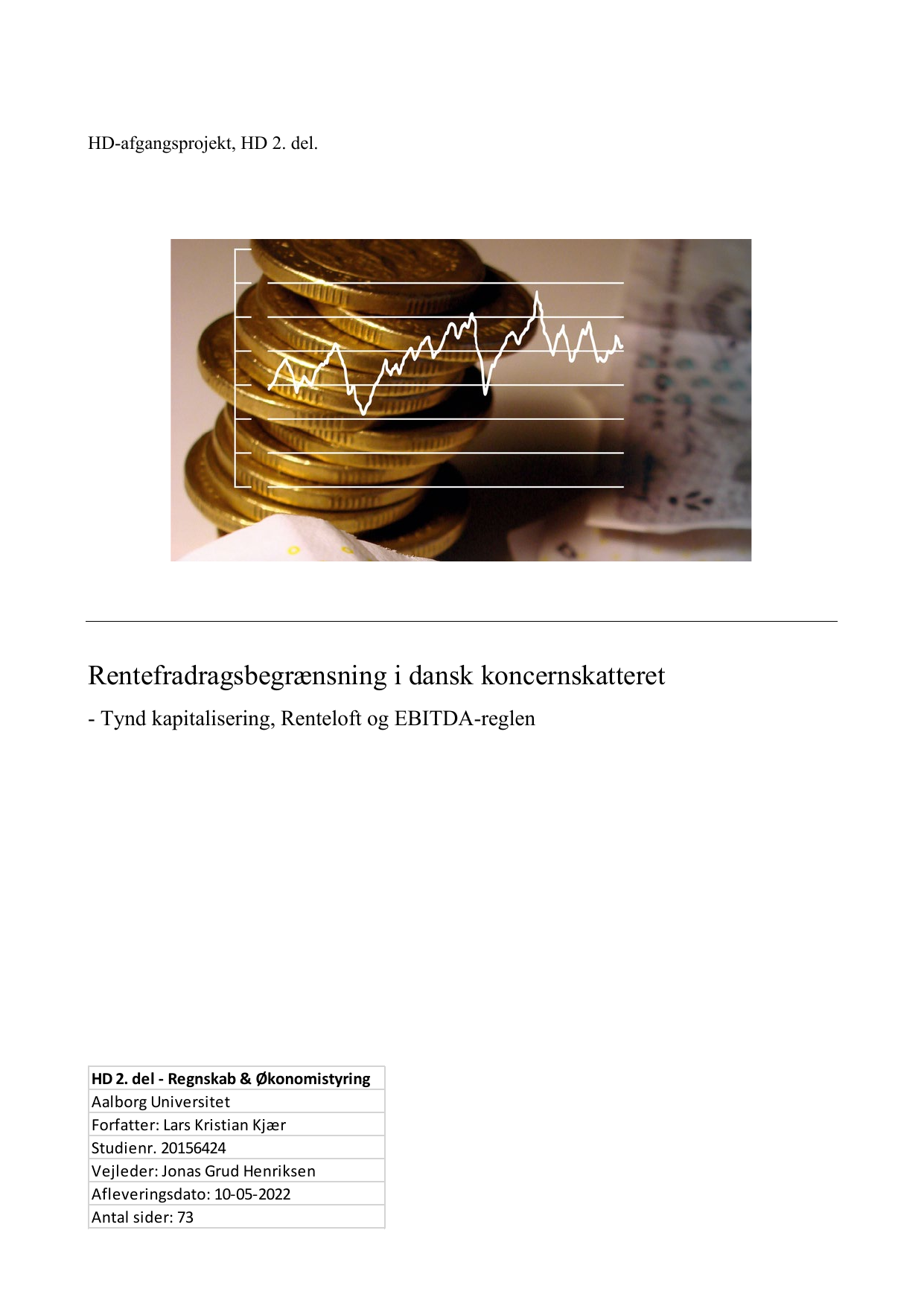
Rentefradragsbegrænsning i koncernskatteretten: Tynd kapitalisering, Renteloft og EBITDA-reglen
Oversat titel
Interest deduction limitation in group tax law: Thin capitalization, interest rate ceiling, the EBITDA rule
Forfatter
Semester
4. semester
Uddannelse
Udgivelsesår
2022
Afleveret
2022-05-09
Antal sider
73
Abstract
I et verdenssamfund med stigende globalisering og teknologisk udvikling vil der være et behov for at samordne og integrere verdensøkonomien som følge af, at flere globalt orienterede koncerner eller kapitalfonde stiller krav om, at grænseoverskridende aktiviteter lettes, og at multinationale koncerners virksomhedsstrukturer ikke hindres unødigt af hensyn til EU-traktatens principper om fri bevægelighed for arbejde og kapital. Skatteoptimering er efterhånden blevet en strategisk målsætning. Fælles for de internationale virksomheder er, at de forstår at udnytte den internationale skatteret til på lovlig vis at opnå skattefordele. Dette sker ofte ved, at indtægter placeres, hvor beskatningen er lavest, mens fradragsberettigede udgifter placeres, hvor værdien af fradraget er højt , hvilket f.eks. kunne være i Danmark. Der vil for disse koncerner eller kapitalfonde konstant være en søgen efter nye, globale markeder, der vil kunne udfordre og udnytte skattelovgivningen. Desværre er den nationale skattelovgivning ikke globalt omstillet, og lovgivningen halter bagefter den hastige udvikling inden for teknologi og økonomi. Multinationale koncerner og kapitalfonde har kunnet benytte sig af koncernopkøb for dermed at minimere skattebetalingen i de enkelte lande afhængig af de europæiske landenes forskellige selskabsskattesatser, og skatteundgåelse har ført til øget fokus på skatteunddragelse. Disse skattetekniske arrangementer har ofte national interesse, og ønsket er, at multinationale virksomheder betaler deres andel af selskabsskat i de lande, hvor driften er repræsenteret. Reglerne om rentefradragsbegrænsning er i sagens natur et sæt komplicerede regler, men hensigten med reglerne er fortsat at sikre, at danske selskaber ikke bliver gældsat med uforholdsmæssig høj fremmedfinansiering i forhold til egenkapital ved at begrænse omfanget af nettofinansieringsudgifter, som koncernen kan få fradrag for i Danmark. Dette HD-afgangsprojekt behandler de muligheder, der eksisterer ifølge dansk skattelovgivning for at begrænse internationale koncerners rentefradrag i Danmark.
By the summer of 1998 the first legislative guidelines of interest deduction limitation were incorporated into Danish Tax Law, which introduced the basic rules of thin capitalization. This is a complex set of rules that are given to make sure that Danish companies would not seek to indebted and thereby transfer profits out of the country, so that the Danish government would lose tax liability. It is often in the national interest to ensure that multinational groups pay their tax liability, and back in 2006 and 2007 the Ministry of Taxation and (then: SKAT) stated that Danish companies, including companies taken over by private equity funds, could minimize tax payments in Denmark by arbitrary to place interest expenses in Denmark, even though the activities and income that the interest expenses financed were not subject to Danish taxation.This was the case, for example, in relation to the companies' purchases of shares in other companies, where returns in the form of dividends or share gains were typically tax-free in Denmark. In this way, the financing of tax-free income could reduce or even eliminate the taxation of operating profits in Denmark. Furthermore, in 2007 a study showed that the Danish state missed a tax liability of more than DKK 2 billion. 2 billion DKK of taxable losses to international private equity funds, and that with the takeover of the groups a significantly tougher indebtedness could be seen with debt capital rather than equity.Although the set of rules only applies to the larger companies, and although the set of rules is complex, the purpose of the rules is that they should try to ensure that Danish groups are not indebted by their foreign owners by limiting the extent of the net financing costs incurred by the group. can receive a deduction for in Denmark.bThe rules in the Corporation Tax Act do not only apply to foreign companies, but the interest deduction limitation rules also apply to large Danish groups, which is why it is also necessary for Danish companies to be aware of when the company risks being deducted without carry-forward rights. This graduation project will include a presentation of the interest deduction limitation in the Danish Corporation Tax Act and will at an operational level come up with proposals for the possibilities the groups have to prevent deductions for interest and net financing costs from being cut. It is the aim of the project to explain and analyze the Danish rules of interest deduction limitations, and to explain which types of companies these rules apply to. The project seeks to clarify whether the companies themselves have the possibilities or opportunities that are required, and thereby effect the limitations.
Emneord
